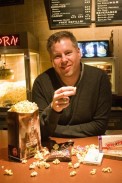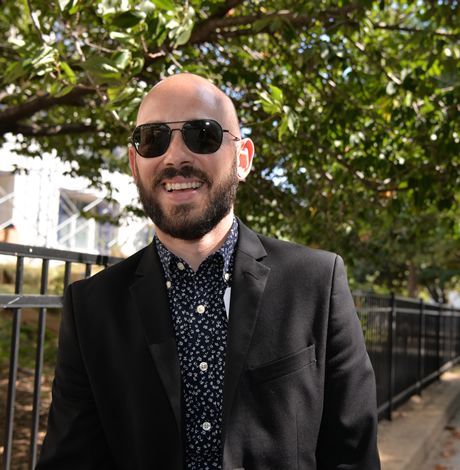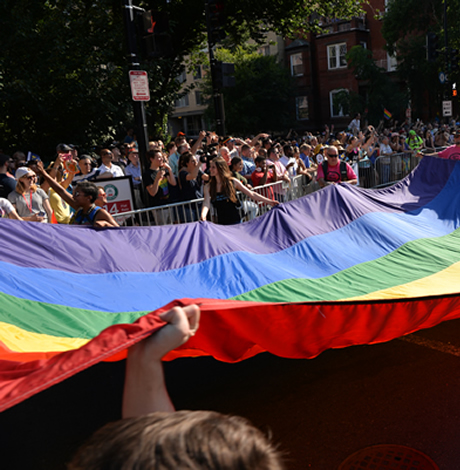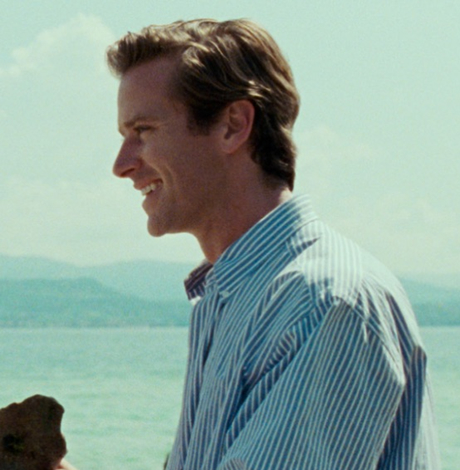Arts & Entertainment
Film, food and fun
D.C. Shorts kicks off ninth annual festival Thursday
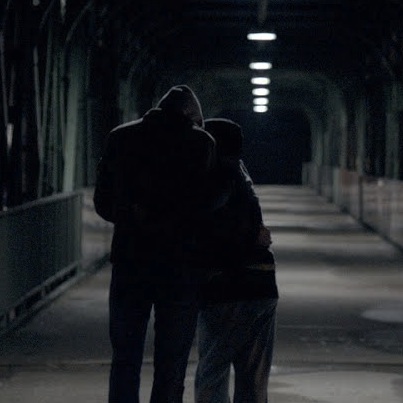
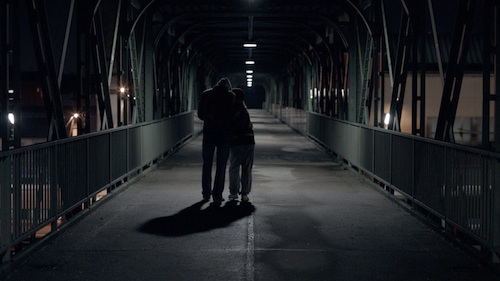
A scene from ‘Hatch,’ a 19-minute LGBT-themed drama directed by Christoph Kuschnig from Austria about two couples forced to make hard decisions on a wintry night. It’s part of ‘Showcase 10,’ a series of films that will be shown on Sept. 8 and 10 at E Street Cinema as part of the D.C. Shorts Film Festival. (Photo courtesy D.C. Shorts)
The D.C. Shorts Film Festival
September 6-16
Various venues
Ticket prices start at $12 and include an online only option
The numbers behind the ninth annual D.C. Shorts Film Festival are staggering: 140 films under 20 minutes long, 27 countries, four venues, eight chefs, 16 showcases, 11 days, five parties and six screenplays staged by local actors. Luckily, Jon Gann and his talented colleagues have it under control and their excellent website guides audience members easily through the festival.
Gann, the openly gay founder and director of the Festival, became interested in filmmaking when he became disenchanted with his work in media relations.
“I owned a graphic design firm for many, many years and I was tired of producing stuff that I thought was great that clients thought was schlock and stuff I thought was schlock that they thought was great, so I decided to go to film school,” he says.
His most notable film to date is the award-winning “Cyberslut,” a nine-minute confession of an unnamed man obsessed with finding sex on the Internet. In intimate and riveting detail, the film tracks his fascination of the online hunt, the frequent disappointment at the first meeting and the occasional ecstatic encounter that sends him back to the computer to hunt again. As the narrator wryly notes, “a computer lets you make more mistakes faster than any other invention in human history, with the possible exception of handguns and tequila.”
Gann’s experience with film festivals (“Cyberslut” has had 47 screenings worldwide, making it one of the most successful gay-themed short films) inspired him to create a different kind of film festival.
“I travelled to festivals all over the world and that’s when I realized that many festivals were about food and parties and sponsors but not necessarily about films or filmmakers,” Gann says. “That’s when I said I need to do something that’s different. The focus of my festival was going to be on filmmakers and if I did that right, then the food and the money and the parties would come.”
Gann has established a system to make the Festival a supportive environment for filmmakers.
“We give feedback to all the filmmakers who enter, whether they make it into the festival or not. We allow them to see their scores and the judges’ comments. That has helped some filmmakers recraft their final edit to make it tighter.”
Gann also realized he wanted to focus on short films (less than 20 minutes). He thinks that “there’s a hunger for really good short content. If Internet use is any indication, people like to see a story in a few minutes.” He adds that short films are also a great way for fledgling artists to learn their craft.
“As a filmmaker,” he says, “if you’re able to tell a succinct story that grabs the audience’s attention and is emotionally gripping in a few minutes, then you know what you’re doing as a storyteller. And that to me is impressive.”
So, in 2004, Gann started the D.C. Shorts Festival, financed largely with money from his own checking account. The first year, 75 films were submitted and 32 films were presented in three screenings for enthusiastic audiences. Looking back on the experience, he says, “It made me a nervous wreck but the whole thing was a big success. We sold out all the tickets and had to turn people away, which was amazing. And it’s grown from there.”
Today, D.C. Shorts is the largest short film festival on the East Coast.
There were more than 850 submissions for the 2012 Festival. After a rigorous selection process, 140 movies were chosen for screening. The films, with run times ranging from one to 20 minutes, are being presented in 16 showcases. Each showcase lasts around 90 minutes. An interactive online tool called “The Film Finder” helps audience members select the programs they’re most interested in seeing. Browsers can sort by showcase, country of origin, genre (documentary, animation, horror, comedy, drama and so on) and interest area (including LGBT, local films and celebrities).
The showcases will be presented at four venues throughout the D.C. region, including the E Street Cinema, the U.S. Navy Memorial, the Atlas Performing Arts Center and the new Angelika Film Center in Fairfax.
In addition to the showcases, there are a variety of other events for filmmakers and film fans to enjoy. For example, patrons can enjoy:
• Free lunch time screenings at the E Street Cinema in downtown D.C.
• Free family and teen screenings at the new Angelika Film Center in Virginia
• A screenplay competition where six scripts (selected from 185 submissions) are given a staged reading by local actors and directors. The winner will receive a cash prize ($1,000 when the award is made and $1,000 when the film is completed) and a slot in the 2013 Festival.
• Free seminars for aspiring and practicing filmmakers
• “The Best of DC Shorts” showcase which features movies selected by audiences during the festival’s opening weekend
• An Awards Brunch with accolades from the festival jury, the festival director, audience members, and a peer award from the filmmakers themselves
• And, a variety of legendary parties that offer “food and drink and DJs and dancing and lots of chances to meet filmmakers.”
Gann adds that that this year’s festival has an emphasis on films about food and includes partnerships with area restaurants.
“We have a big food-film program this year,” he says. “We’ve paired eight films with local chefs who’ve prepared special dishes based on those films. At those films, you can actually sample the food at the end of the screening.”
For example, “Murder Mouth” by first-time Australian filmmaker Madeleine Parry is a documentary showing how, “Madeleine decides that unless she kills it, she can’t eat it.” The film is paired with Ed Witt’s recipe for Crostini with Lamb Tartare, which will be served to audience members after select screenings. Like Maddie in the film, the chef from 701 argues that, “Modern day carnivores have become so disconnected from their food that they are unable to identify it without the labels from the grocery store.”
Queer themes
Several selections in this year’s Festival have LGBT storylinesThe D.C. Shorts Film Festival includes 10 films with explicitly LGBT content. They are sprinkled throughout the showcases, often in interesting combinations with other films.
The most delightful, a modern day fairy tale called “The Maiden and the Princess,” is actually part of the free Family Showcase on Sept. 15 at the Angelika Film Center. Directed by American filmmaker Ali Scher, this charming film tells the story of Emmy, who is teased by her classmates and rebuked by her parents when she kisses another girl.
Luckily Hammond, a narrator with the Grand High Council of Fairy Tale Rules and Standards intervenes. He transports himself (in fairy godmother drag) and Emmy into a musical fairy tale that reassures Emmy that her feelings are perfectly normal and that convinces Hammond’s stodgy superior to let him put the “fairy” back in fairy tale.
Scher was very clear about her aim in making the film, saying “My goal with this project is to cut through the silence and facilitate honest communication between children and parents about sexual orientation.” She affirms that she made the movie so that “no kid ever has to feel ashamed of who they are. We as a society need to encourage individuality in children, even if it means exposing them to things we are afraid of.”
A much darker story is told in “Hatch” by Austrian director Christopher Kuschnig, who won a student Oscar for the film. “Hatch” tells the stories of two couples whose lives intersect on a wintry night in Vienna and the baby whose fate will be changed by the decisions they make. Kuschnig succeeds in using an innovative narrative and visual style to capture both the inner dynamics of each couple and the broader social implications of their desperate acts.
“‘Hatch’ is much more than the story of one couple’s wrenching decision and another’s criminal act,” he says. “I was particularly interested in each couple’s distinct dynamics and how these events on this particular night could challenge their assumptions of each other, and therefore alter their relationships and eventually their lives.”
Some of the other LGBT films in the Festival are “The Queen of My Dreams,” a Bollywood influenced take on a young lesbian’s coming-out story; “Cobra,” which takes a grieving father from the funeral of his estranged son to the bar where his son performed; and “The Gay Who Wasn’t Gay Enough,” a hard-hitting take on conformity in the gay community. — BRIAN T. CARNEY
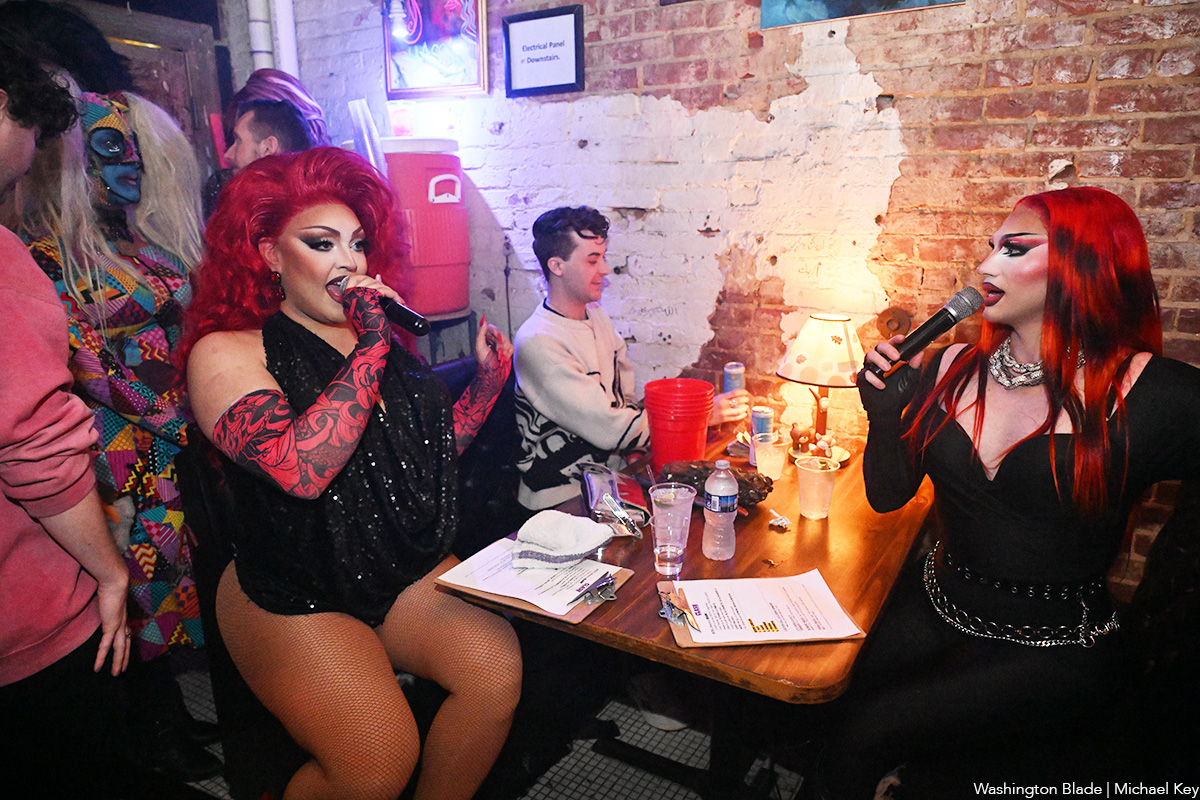
Crimsyn and Tatianna hosted the new weekly drag show Clash at Trade (1410 14th Street, N.W.) on Feb. 14, 2026. Performers included Aave, Crimsyn, Desiree Dik, and Tatianna.
(Washington Blade photos by Michael Key)
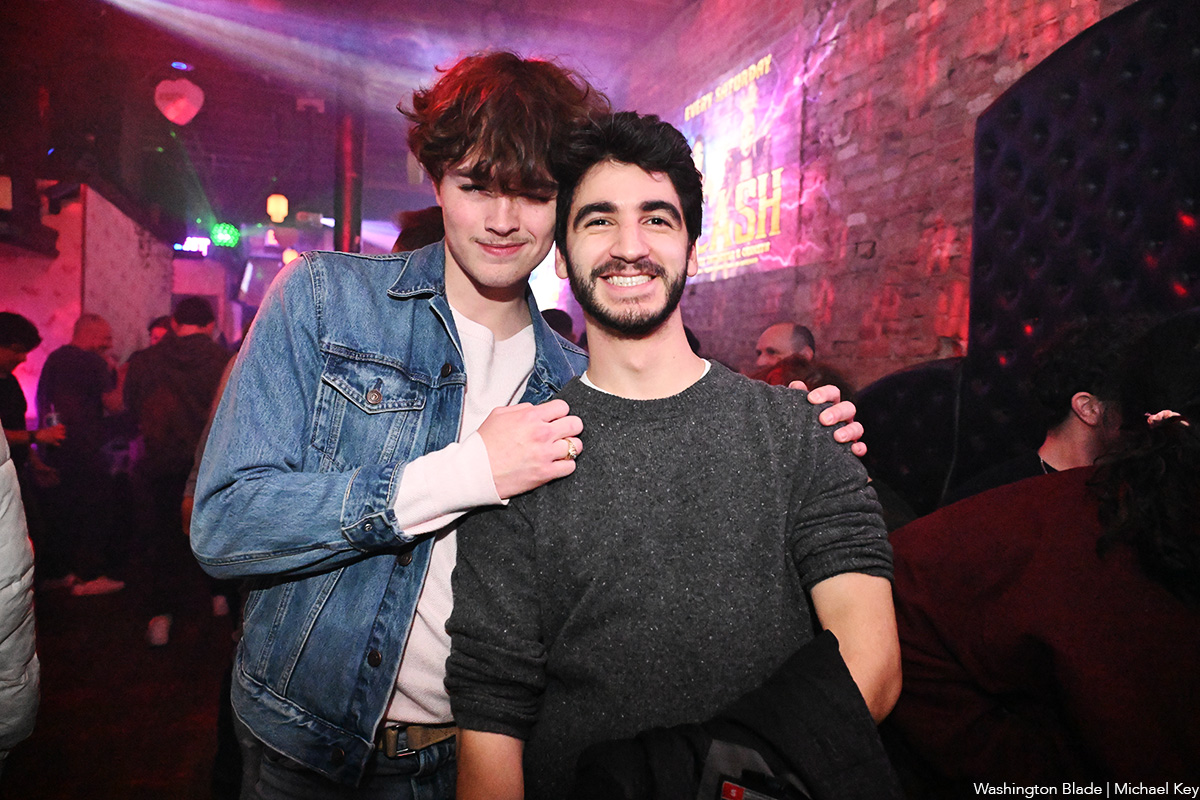
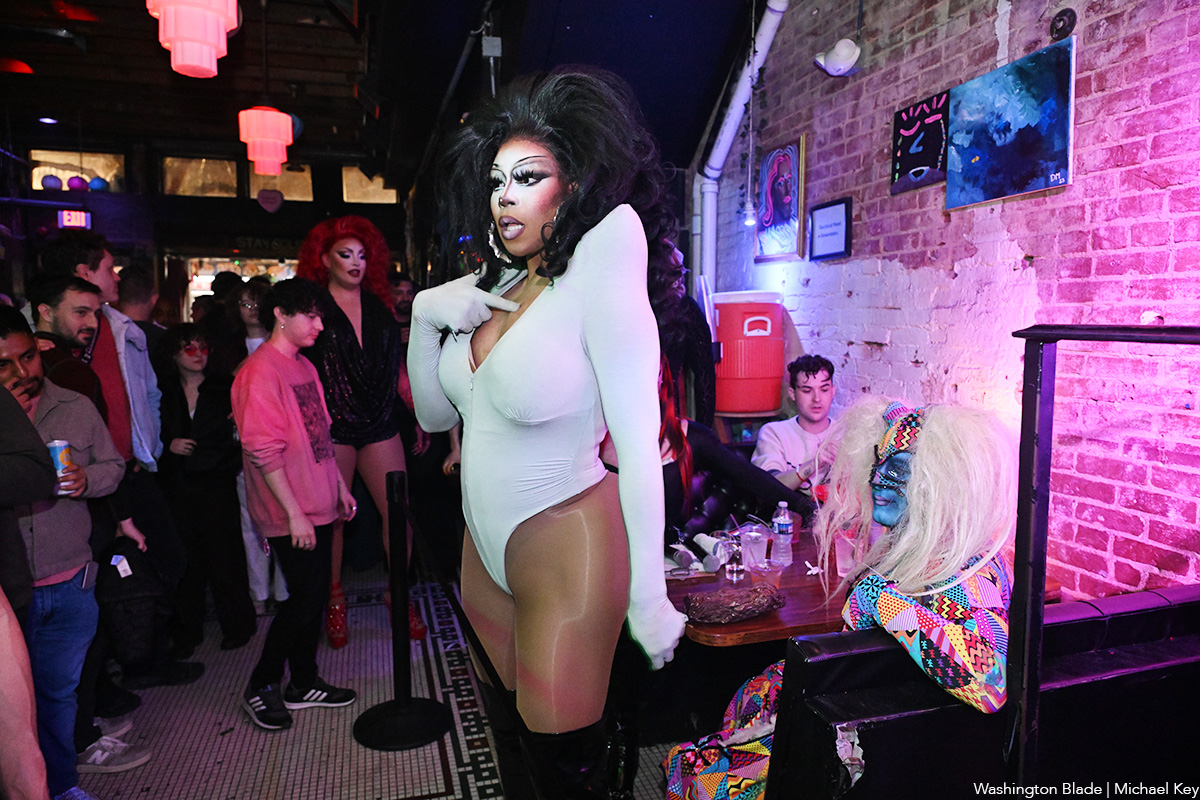
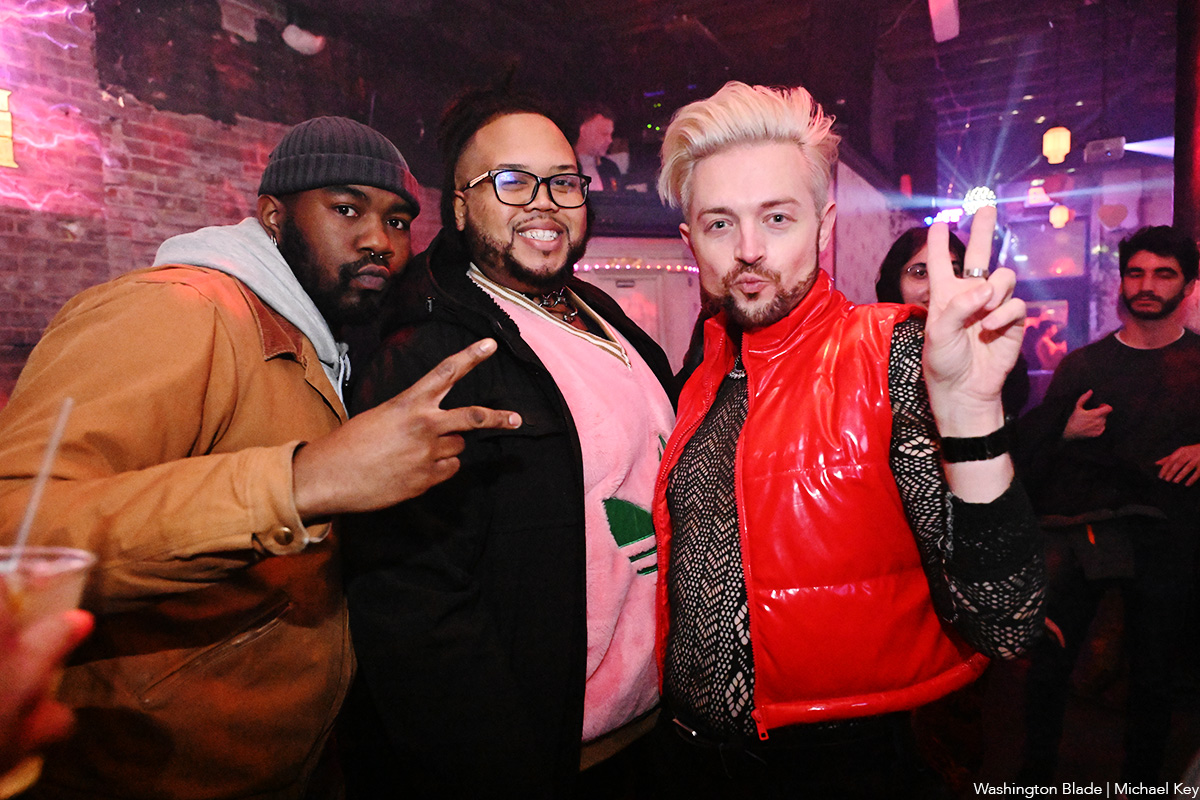
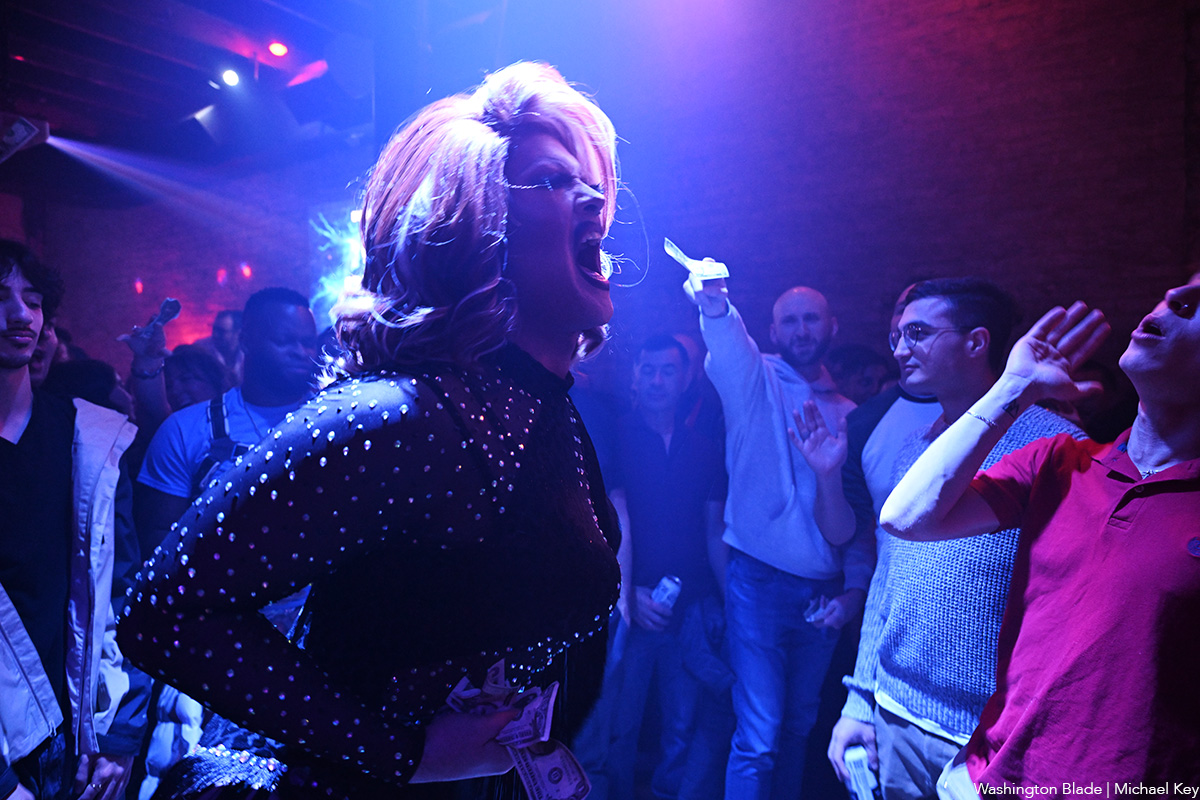

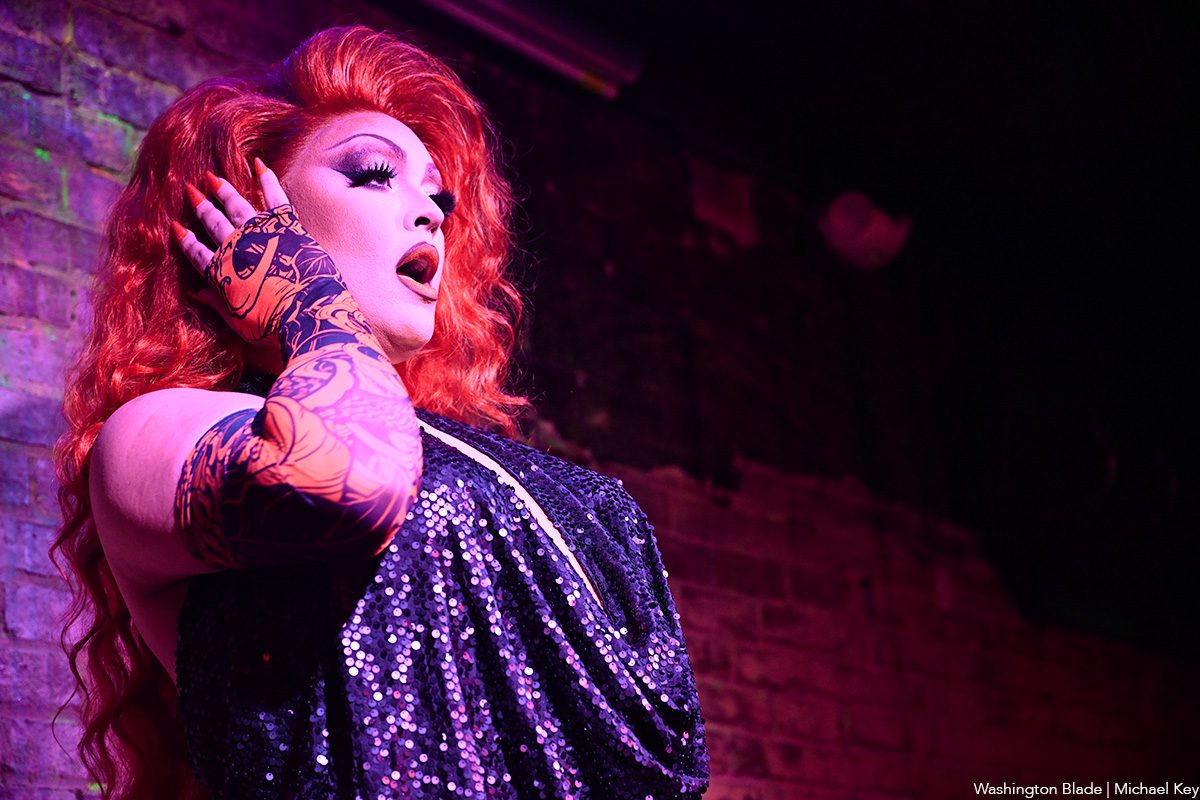
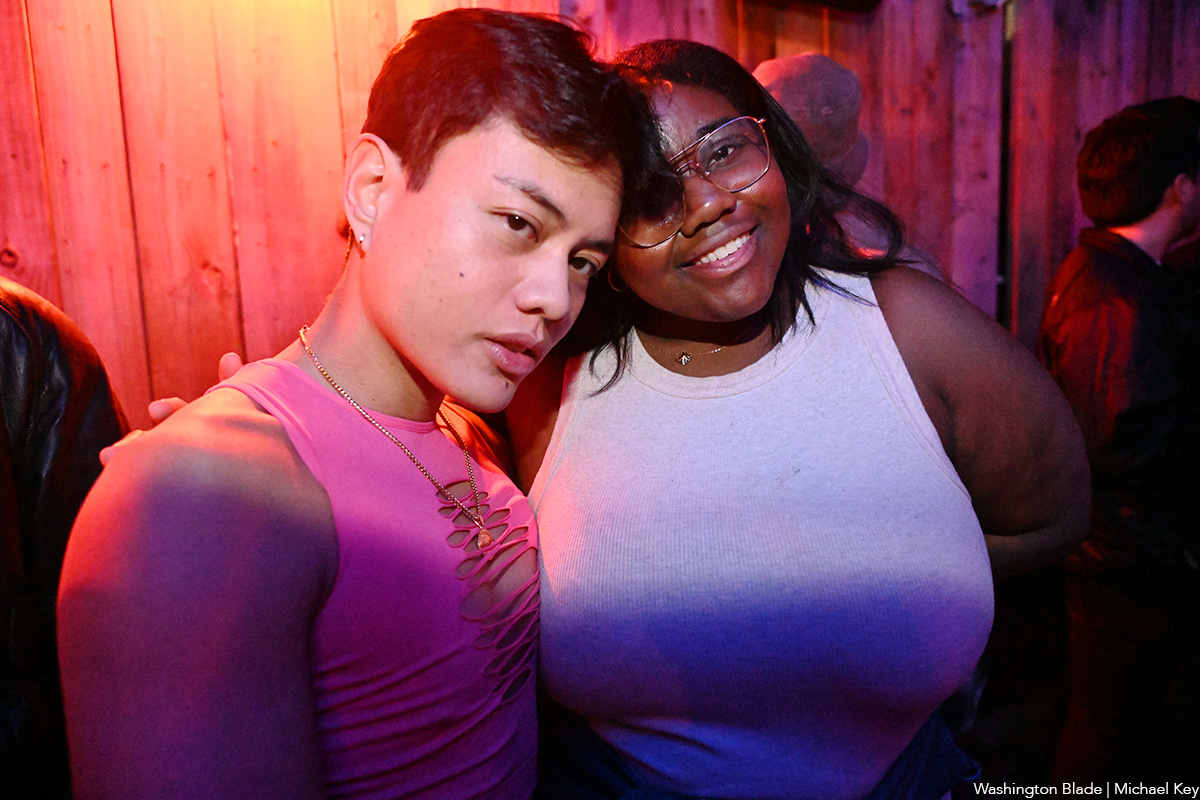
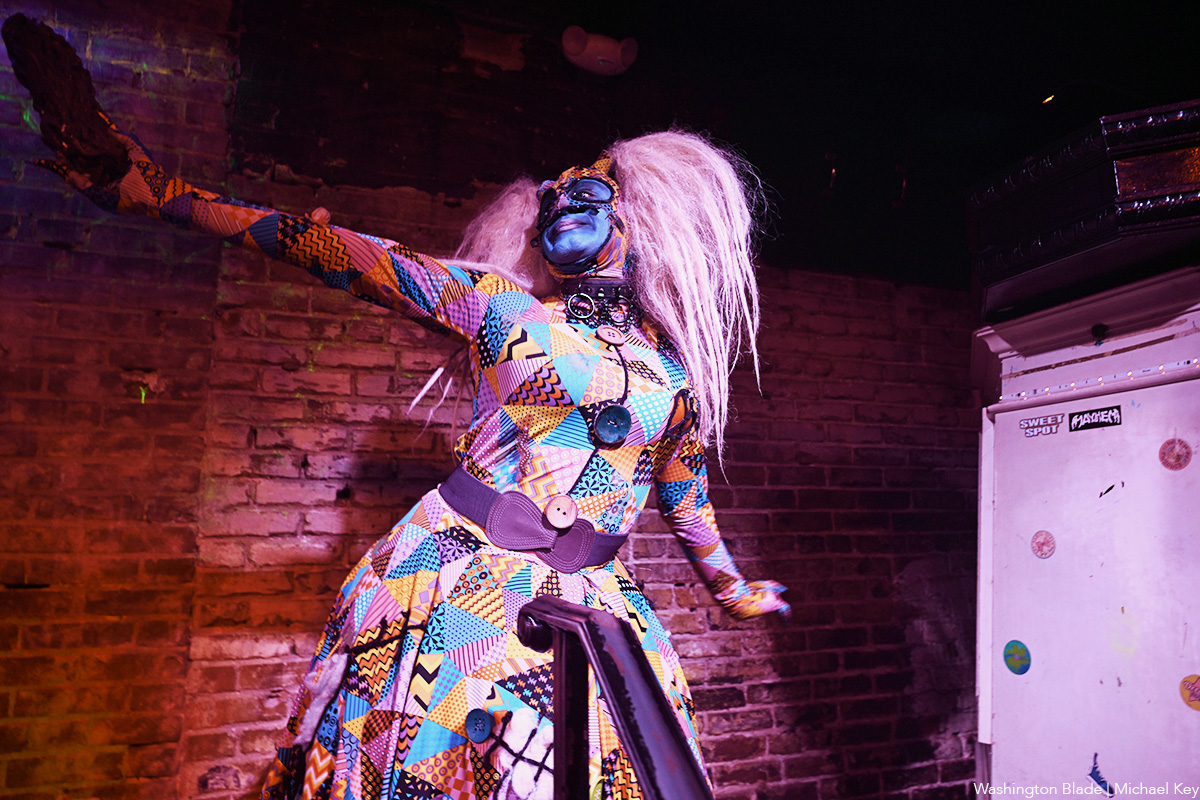
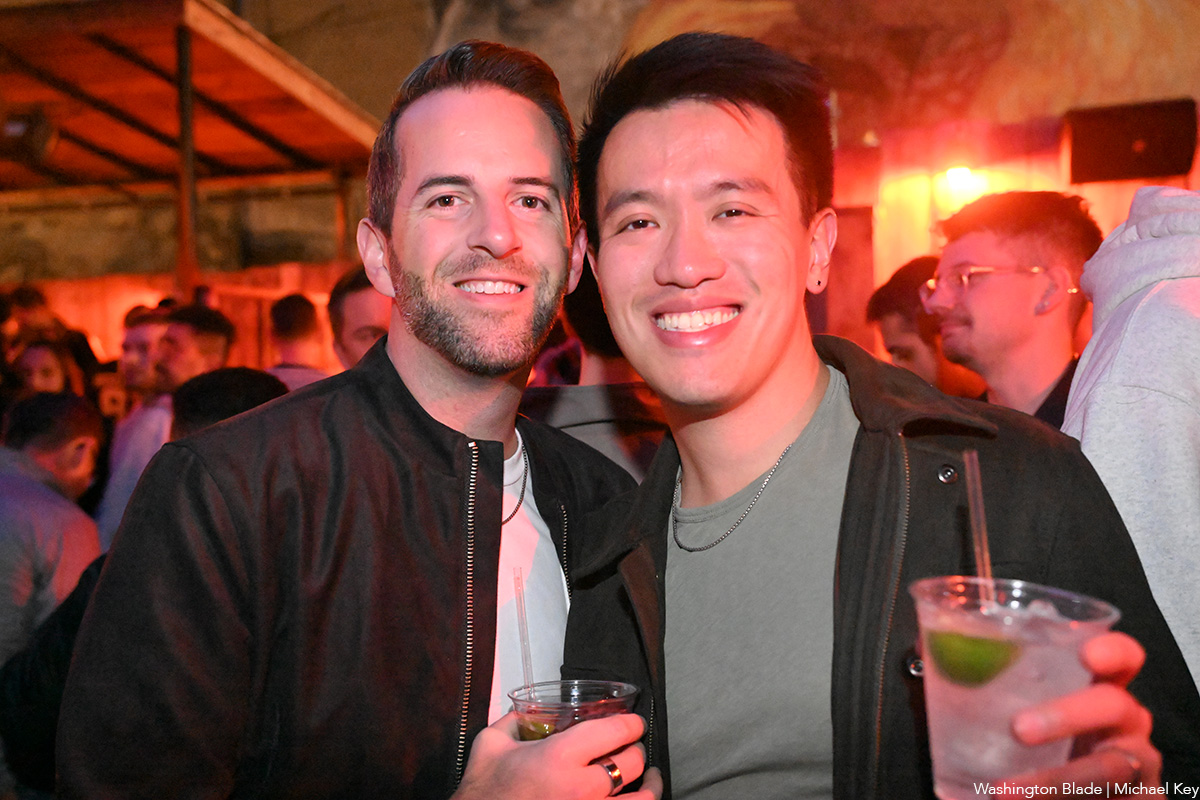
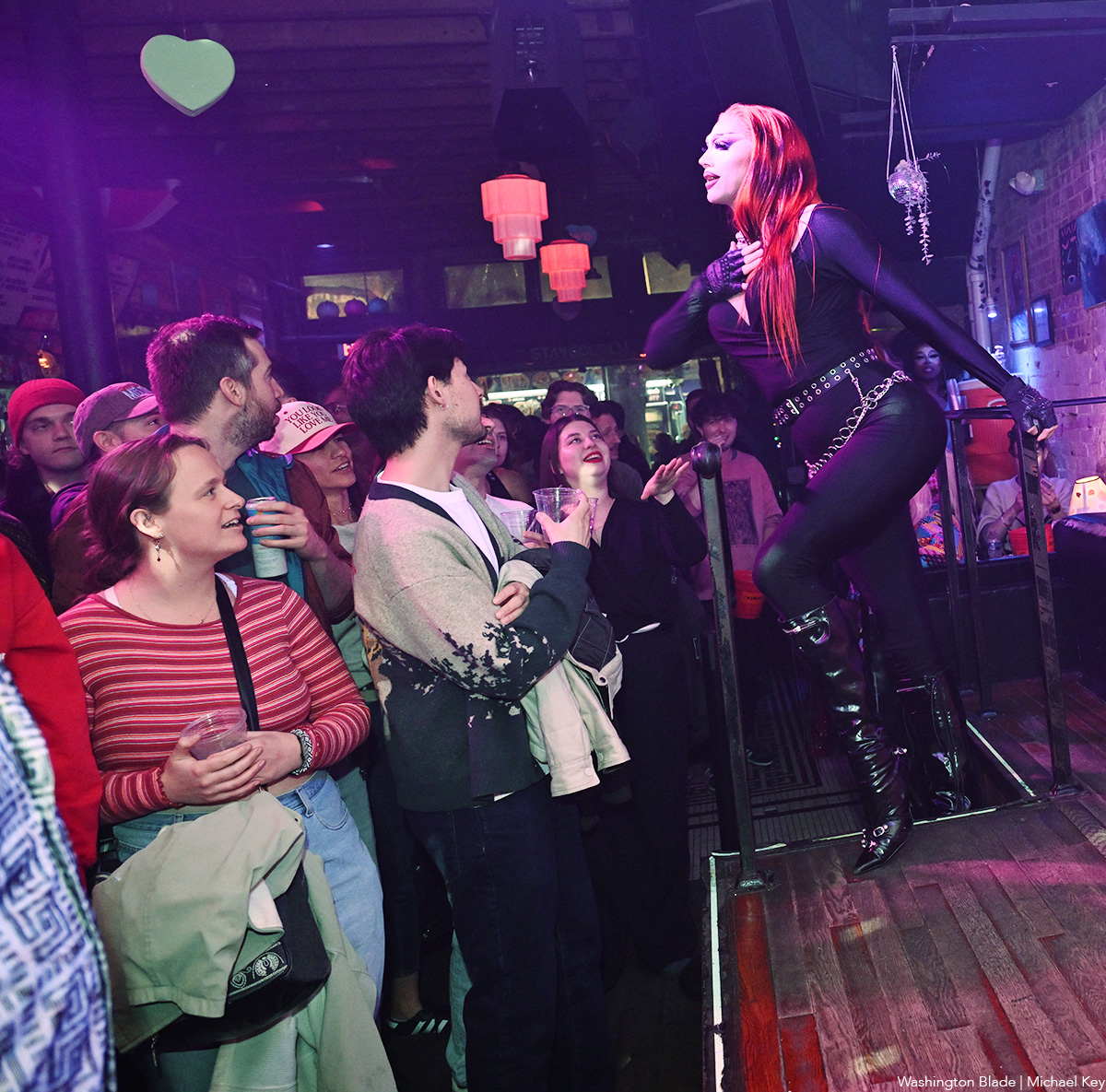
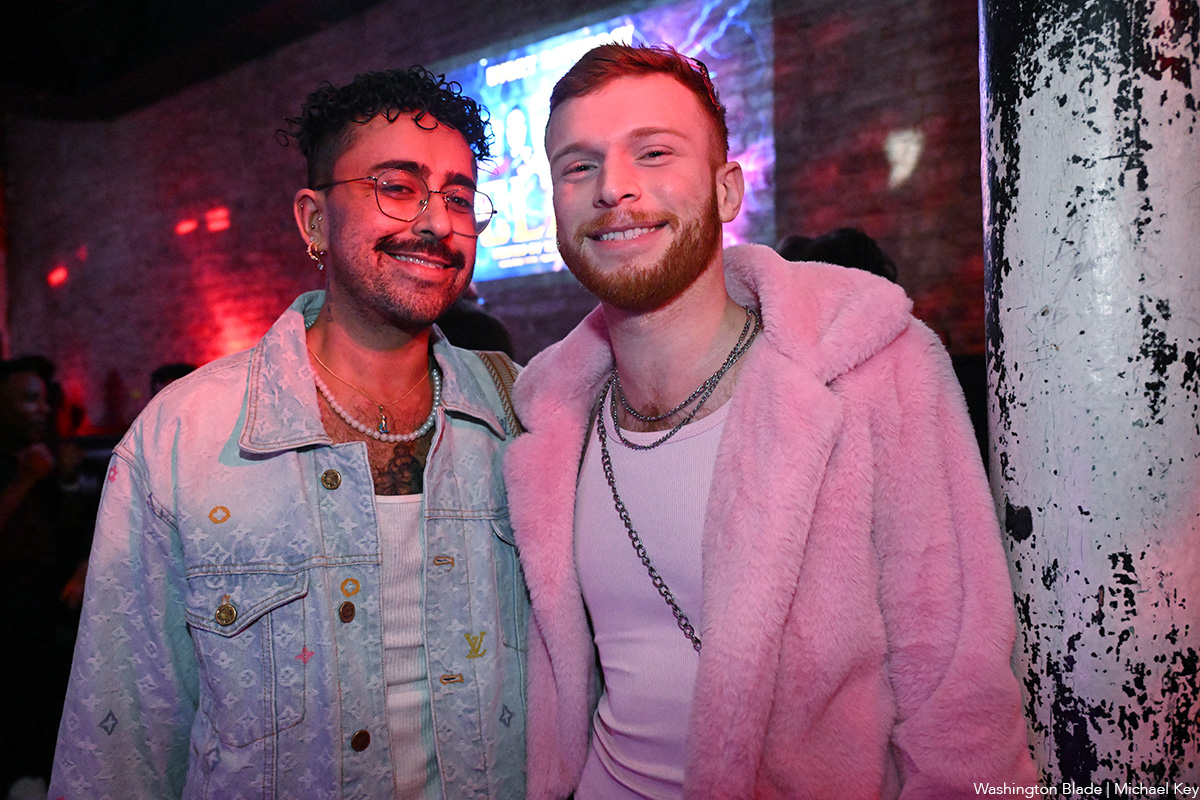
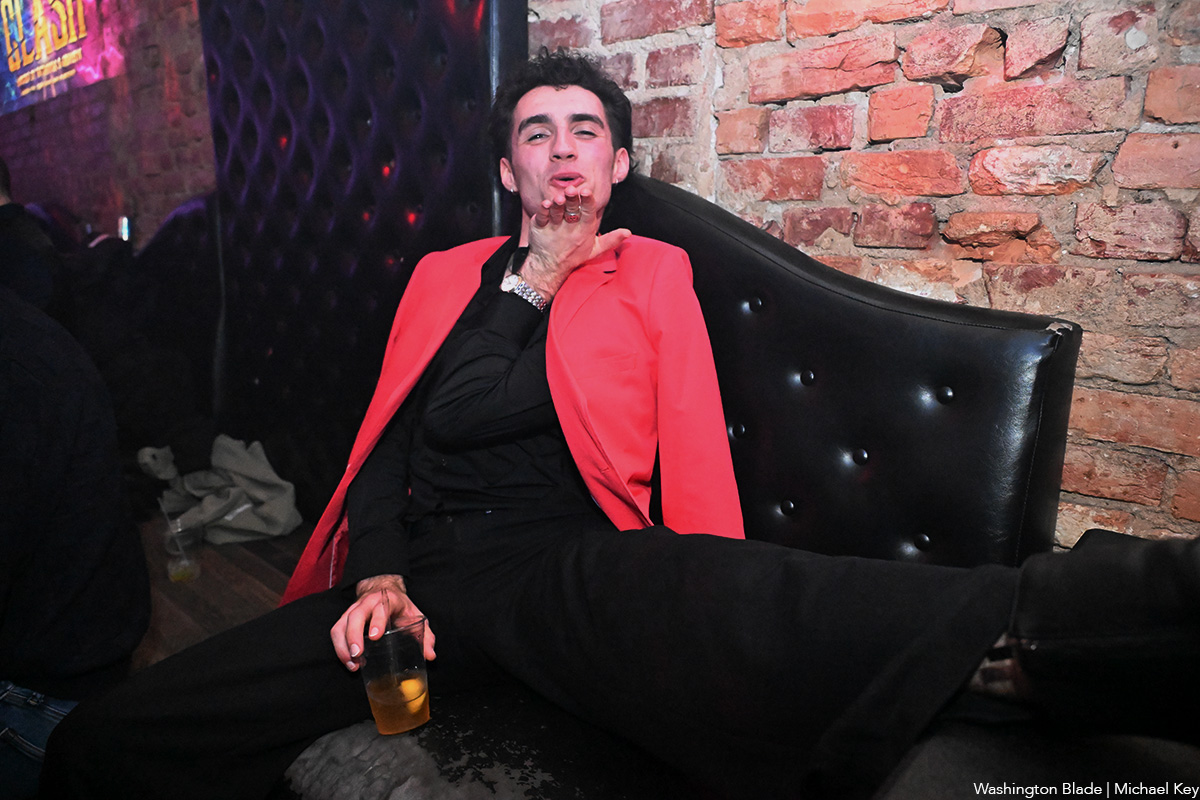
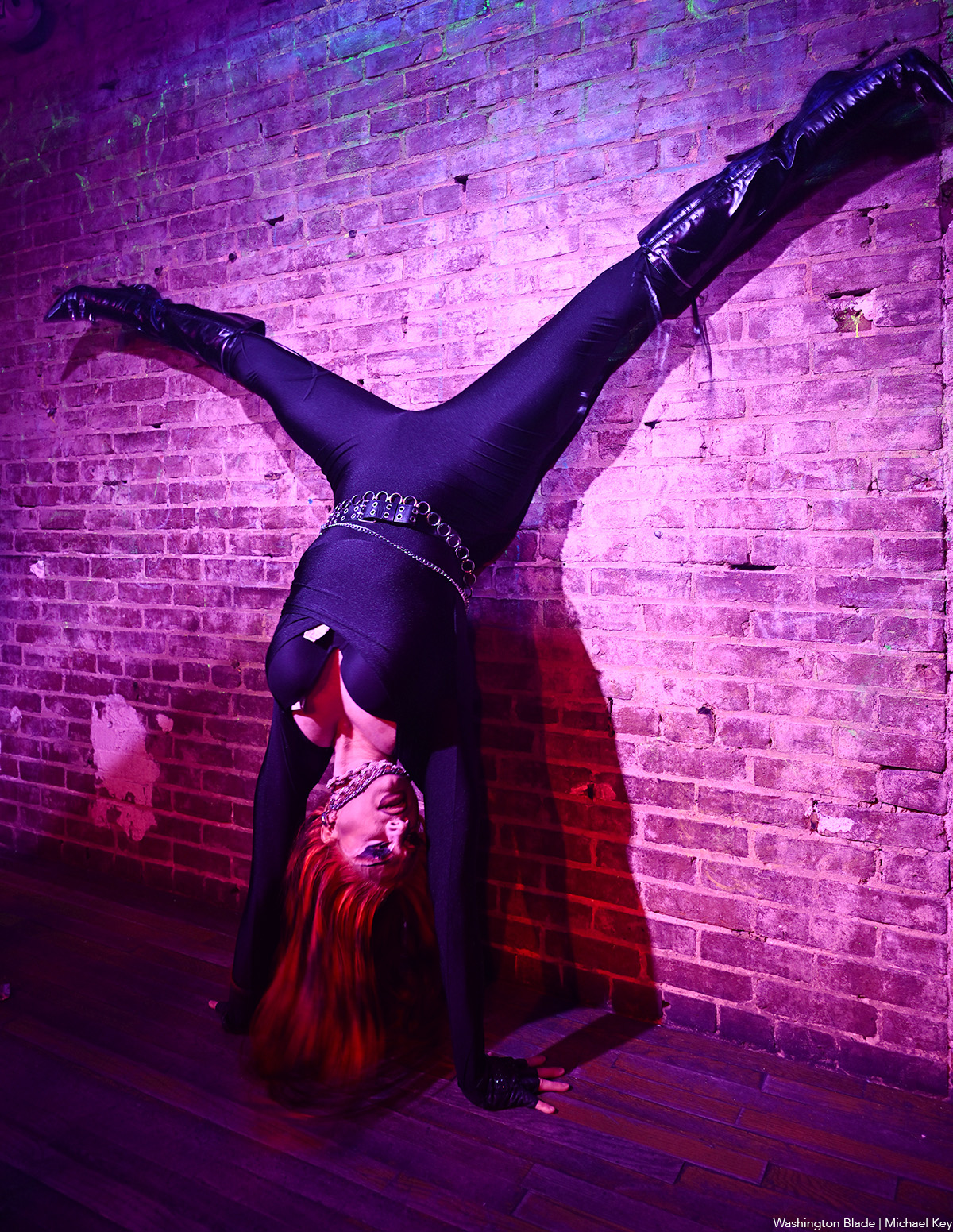
Theater
Magic is happening for Round House’s out stage manager
Carrie Edick talks long hours, intricacies of ‘Nothing Up My Sleeve’

‘Nothing Up My Sleeve’
Through March 15
Round House Theatre
4545 East-West Highway
Bethesda, Md. 20814
Tickets start at $50
Roundhousetheatre.org
Magic is happening for out stage manager Carrie Edick.
Working on Round House Theatre’s production of “Nothing Up My Sleeve,” Edick quickly learned the ways of magicians, their tricks, and all about the code of honor among those who are privy to their secrets.
The trick-filled, one-man show starring master illusionist Dendy and staged by celebrated director Aaron Posner, is part exciting magic act and part deeply personal journey. The new work promises “captivating storytelling, audience interaction, jaw-dropping tricks, and mind-bending surprises.”
Early in rehearsals, there was talk of signing a non-disclosure agreement (NDA) for production assistants. It didn’t happen, and it wasn’t necessary, explains Edick, 26. “By not having an NDA, Dendy shows a lot of trust in us, and that makes me want to keep the secrets even more.
“Magic is Dendy’s livelihood. He’s sharing a lot and trusting a lot; in return we do the best we can to support him and a large part of that includes keeping his secrets.”
As a production assistant (think assistant stage manager), Edick strives to make things move as smoothly as possible. While she acknowledges perfection is impossible and theater is about storytelling, her pursuit of exactness involves countless checklists and triple checks, again and again. Six day weeks and long hours are common. Stage managers are the first to arrive and last to leave.
This season has been a lot about learning, adds Edick. With “The Inheritance” at Round House (a 22-week long contract), she learned how to do a show in rep which meant changing from Part One to Part Two very quickly; “In Clay” at Signature Theatre introduced her to pottery; and now with “Nothing Up My Sleeve,” she’s undergoing a crash course in magic.
She compares her career to a never-ending education: “Stage managers possess a broad skillset and that makes us that much more malleable and ready to attack the next project. With some productions it hurts my heart a little bit to let it go, but usually I’m ready for something new.”
For Edick, theater is community. (Growing up in Maryland, she was a shy kid whose parents signed her up for theater classes.) Now that community is the DMV theater scene and she considers Round House her artistic home. It’s where she works in different capacities, and it’s the venue in which she and actor/playwright Olivia Luzquinos chose to be married in 2024.
Edick came out in middle school around the time of her bat mitzvah. It’s also around the same time she began stage managing. Throughout high school she was the resident stage manager for student productions, and also successfully participated in county and statewide stage management competitions which led to a scholarship at the University of Maryland, Baltimore County (UMBC) where she focused on technical theater studies.
Edick has always been clear about what she wants. At an early age she mapped out a theater trajectory. Her first professional gig was “Tuesdays with Morrie” at Theatre J in 2021. She’s worked consistently ever since.
Stage managing pays the bills but her resume also includes directing and intimacy choreography (a creative and technical process for creating physical and emotional intimacy on stage). She names Pulitzer Prize winning lesbian playwright Paula Vogel among her favorite artists, and places intimacy choreographing Vogel’s “How I learned to Drive” high on the artistic bucket list.
“To me that play is heightened art that has to do with a lot of triggering content that can be made very beautiful while being built to make you feel uncomfortable; it’s what I love about theater.”
For now, “Nothing Up My Sleeve” keeps Edick more than busy: “For one magic trick, we have to set up 100 needles.”
Ultimately, she says “For stage managers, the show should stay the same each night. What changes are audiences and the energy they bring.”

Friday, February 13
Center Aging Monthly Luncheon With Yoga will be at noon at the DC Center for the LGBT Community. Email Mac at [email protected] if you require ASL interpreter assistance, have any dietary restrictions, or questions about this event.
Go Gay DC will host “LGBTQ+ Community Happy Hour Meetup” at 7 p.m. at Freddie’s Beach Bar and Restaurant. This is a chance to relax, make new friends, and enjoy happy hour specials at this classic retro venue. Attendance is free and more details are available on Eventbrite.
Women in their Twenties and Thirties will be at 7 p.m. on Zoom. This is a social discussion group for queer women in the D.C. area. For more details, visit the group on Facebook.
Saturday, February 14
Go Gay DC will host “LGBTQ+ Community Brunch” at 11 a.m. at Freddie’s Beach Bar & Restaurant. This fun weekly event brings the DMV area LGBTQ community, including allies, together for delicious food and conversation. Attendance is free and more details are available on Eventbrite.
The DC Center for the LGBT Community will host a screening of “Love and Pride” at 1:30 p.m. This event is a joy-filled global streaming celebration honoring queer courage, Pride, and the power of love. It’s a bold celebration of courage and community — a fearless reminder of what we’ve overcome, how love is what makes us unstoppable, and how we have always turned fear into fierce. For more details, visit the Center’s website.
Sunday, February 15
LGBTQ+ Community Coffee and Conversation will be at 12 p.m. at As You Are. This event is for people looking to make more friends and meaningful connections in the LGBTQ community. Attendance is free and more details are available on Eventbrite.
Monday, February 16
Queer Book Club will be at 7:00p.m. on Zoom. This month’s read is “Faebound” by Saara El-Arifi. For more details, visit the DC Center’s website.
“Center Aging: Monday Coffee Klatch” will be at 10 a.m. on Zoom. This is a social hour for older LGBTQ+ adults. Guests are encouraged to bring a beverage of choice. For more information, contact Adam ([email protected]).
Tuesday, February 17
Center Bi+ Roundtable will be at 7 p.m. on Zoom. This is an opportunity for people to gather in order to discuss issues related to bisexuality or as Bi individuals in a private setting.Visit Facebook or Meetup for more information.
Wednesday, February 18
Job Club will be at 6 p.m. on Zoom upon request. This is a weekly job support program to help job entrants and seekers, including the long-term unemployed, improve self-confidence, motivation, resilience and productivity for effective job searches and networking — allowing participants to move away from being merely “applicants” toward being “candidates.” For more information, email [email protected] or visit thedccenter.org/careers.
Thursday, February 19
The DC Center’s Fresh Produce Program will be held all day at the DC Center for the LGBT Community. To be fair with who is receiving boxes, the program is moving to a lottery system. People will be informed on Wednesday at 5 p.m. if they are picked to receive a produce box. No proof of residency or income is required. For more information, email [email protected] or call 202-682-2245.
Virtual Yoga Class will be at 7 p.m. on Zoom. This free weekly class is a combination of yoga, breath work and meditation that allows LGBTQ+ community members to continue their healing journey with somatic and mindfulness practices. For more details, visit the DC Center’s website.

